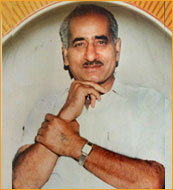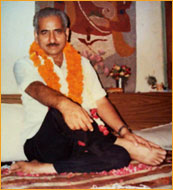Love, Devotion & Compassion
Param Pujya Guruji once told me that the greatest conviction in life is the fact that we are loved; nay, that we are loved in spite of ourselves. Jesus Christ said, “Love thy neighbour”. The ancient Indian sages and seers of this wonderful land (Bharat) had a very wide vision and expounded the doctrine of Vasudhaiva Kutumbakam (that the entire world is one family) and we all are children of the same Lord – Jeevatma and the Brahmatma.
Love begins with two, but ultimately one merges into the other. There are no conditions in real love. It’s only condition is purity and piety. Wherever these basic elements are missing, love is reduced to sensuous desires and it merely becomes a network of words. Real love and compassion sprout and nurture at a much deeper level of pure feelings.
Love demands sacrifice. He only can love who can sacrifice. Feelings of pure love urge you to give and it continues to flow without any obstruction. Real love does not ask for anything in return. The one who loves is not a beggar. He is large-hearted like a cloud and showers nectar at the slightest warmth. Only that person who offers himself in entirety can be a subject of love. Partial offer or expectation of something in return reduces love to mere trading, and love is not trading.
Let us remember, the moment you sow the seeds of reciprocation, you are tied down to a feeling of expectation, which results in unhappiness and discontent in the event of not getting the desired fruits of one’s action. In such a situation, the sublime act of love and compassion is reduced to mere trading. Alas! In today’s context, love and compassion without reward have become meaningless and the intense desire to have something in return has reduced human beings to beggars.
One of the basic objects of human birth is to render selfless service to others, to relieve others of their sufferings and to find happiness in others’ happiness. The act of expressing love and compassion without expecting anything in return is complete in itself. When there is no feeling of ‘karta’ (the doer) in the act and no desire to reap its fruits, then such an act is fulfilling both to the giver and the recipient. It is a different story that by the law of nature, whatever we give multiplies manifold and comes back to us in abundance.
Mother Nature has umpteen number of examples to prove that she only gives and does not ever expect anything in return. She provides us the very basic elements for our survival (earth, space, water, air, light, heat, vegetation, medicinal herbs…..the list is endless) and yet never ever asks for anything in return. The Lord Himself says, “I am not the ‘Karta’, nor am I the ‘bhogta’. Then how can the ‘jeevatma’, which is an inseparable part of ‘Brahmatma’’, be different from its root-source?
People who live at the level of body, senses and mind, tend to restrict the significance of love and compassion. More often than not, they get involved in ego-centric desires and try to derive pleasures and pains from sensuous objects, which are temporary and fleeting. For them, love and compassion is a way of humouring their whims and fancies. Such persons do not even hesitate to jeopardize an age-old or a close relationship on some trivial pretext, when their wishes are not fulfilled. How sad, they seem to have lost the meaning of love that gives life everything in its entirety and devotion that overwhelms the inner-self with compassion. They need to graduate from the level of corporal frame and senses to the level of conscious.
Once, Lord Krishna, preoccupied with his work at Dwarka, was not able to go to Vrindavan to meet Radha and the ‘sakhis’. Instead, he sent his friend, Udhav, along with a communication to Radha explaining his inability to come. Perceiving the agony of separation from Krishna, that Radha and the ‘sakhis’ were suffering from, Udhav tried to enlighten them with ‘Jnanyoga’. “Which agony of separation are you talking about, Udhavji? Krishna has always been with us. If you wish to see Krishna, see him in me”. And Radha manifested Krishna in herself. Krishna lived in her mind and consciousness. It does not really matter whether Lord Krishna is physically in Dwarka, but in spirit He lives with Radha and the ‘sakhis’. Such is the intensity of love and devotion that you forget your own entity and merge with the loved one - that is, in reality, true love, devotion and compassion.
God created this universe and mankind with a sense of dedication and with a spirit of sacrifice. At the beginning of creation, the Creator, Lord Brahma, gave the following advice to our first ancestors: “May you multiply and prosper with this spirit of sacrifice (free from attachment); may this yield the enjoyments you seek. Foster each other with a sense of sacrifice and let the Gods be gracious to you. Thus fostering each other unselfishly, you will attain the highest good….”
The important words are sacrifice and foster. A mother fostering a child is a unique example of sacrifice, love and compassion. Interestingly, when you render service to your fellow-beings with a sense of sacrifice (without expecting anything in return) and when your act of ‘’sewa’’ (selfless service) is performed with love and compassion, you establish an unbreakable bond of ‘bhavana’ with them, which is gratifying both to the giver and the recipient. Such an act of a ‘karamyogi’ generates ‘satoguna’ and the all pervading infinite is always present where such ‘karmas’ are being performed.
When you perform an act with love and compassion, relinquishing all attachment, as if to do so is your ‘swadharma’, then you are freed from the bondage of expectation (attachment to the fruit of action) and the act becomes a ‘yajna’, which opens the doors to salvation – the eternal quest of any human being.

